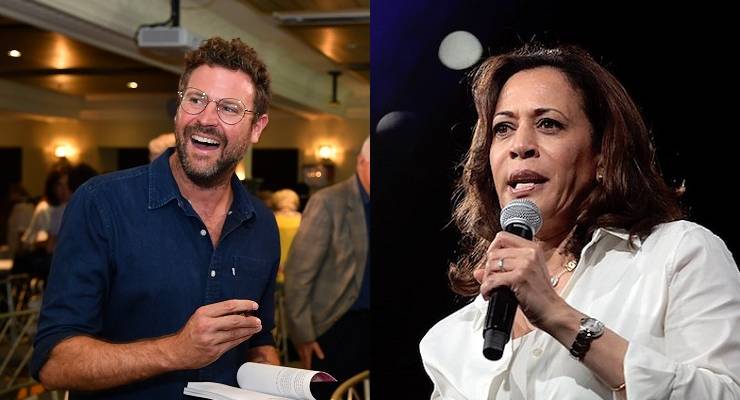
A week ago The Australian‘s editorial cartoonist Johannes Leak published a cartoon depicting US Democratic nominee Joe Biden describing his VP pick Kamala Harris as a “little brown girl”. The outrage was instantaneous and sustained.
All day, social media roundly condemned Leak as racist and the cartoon was referred for adjudication to the Press Council.
In the aftermath, we asked several current and former prominent editors if they would have published the cartoon; only one went on the record.
Sydney Morning Herald editor Lisa Davies weighed in: “While these are incredibly vexed decisions, I don’t think the Herald would have published that cartoon. I found it to be a clumsy attack on Biden’s announcement of a running mate, dismissing a significant moment as pure tokenism. That said, it’s a big call not to publish a cartoonist’s take and never one done lightly.”
The Australian‘s editor-in-chief Chris Dore told The Guardian that “Johannes was quoting Biden’s words” and pointed to a tweet Biden posted last Thursday.
In the tweet, Biden had said, “This morning, little girls woke up across this nation — especially Black and Brown girls who so often may feel overlooked and undervalued in our society — potentially seeing themselves in a new way: as the stuff of Presidents and Vice Presidents.”
So I asked the editorial brains of Crikey, Peter Fray and Eric Beecher, for their views.
Cartoonists and editors have ongoing dialogue, said Fray, former editor-in-chief of the SMH and deputy editor of The Australian.
“Typically, the main editorial cartoonist will present options to an editor and there might be some discussion along the lines of, that’s good, not that one, oh, maybe tweak that,” he said.
“In this case, my first instinct would have been to ask, what else you got? The Biden cartoon isn’t funny and it is offensive. Yes, he has a right to offend. But it’s a matter of fine degrees. This one crossed a line for me. It’s simply not his best work. Of course, once published an editor’s instinct is always to defend. In this case, Dore is defending a cartoon that many people see as inherently racist and inappropriate.”
Beecher, a former SMH editor and an editor-in-chief at Herald Weekly Times, added: “Of course, if you’re editor of The Australian, you publish. It fits every commercial criteria in your PD: outrage, getting talked about, social media traffic and absolute alignment with the prejudices of your core readership. Even better, your bosses love it when you tick all those boxes they created for you. And there’s no issue about ethical behaviour, because there’s no box for that at The Australian.”
So much for editors, what about cartoonists themselves?
As one of the country’s leading editorial cartoonists, Nine’s Cathy Wilcox is often asked for her views on rival’s cartoons. In 2016, when Johannes’ late father and fellow cartoonist Bill Leak was pilloried for racism over a cartoon, she said that she would not have censored it. Wilcox has always maintained that being an advocate for free speech means supporting the right to speak for people with whom she profoundly disagrees and evens finds offensive.
Last Friday Wilcox responded to a query about the Leak cartoon.
“I think the criticism is over the top. I think the cartoonist intended to criticise Biden,” she said. “[However] I think the ‘context’ — a Murdoch paper, with a track record of racist cartoons, and the particular heritage of the cartoonist – means there is no benefit of the doubt.
“That said, I think it’s a terrible take, as it reduces what is a hugely significant cultural moment to an act of tokenism, which I don’t believe it is.”
Yesterday, while pointing out that her “particular privilege means [she’s] not the best placed to judge what is racist”, Wilcox expanded on the topic, saying she “feared putting forth an opinion that differed from the unequivocal condemnation, even though [she] felt it imputed a much more malign motive to the cartoonist, and let Biden’s obvious record of racist mis-statements, creepy treatment of women and evident senility off the hook”.
To the charge that Leak took Biden’s words out of context, Wilcox said she did this in her cartoons all the time.
“It’s how I use the words of the powerful against them. I understood that the offence was in reducing a highly meritorious candidate to a token choice, but that was arguably Biden’s offence, not the cartoonist’s.”
On this, the Walkley Award winning cartoonist feels torn. “Do I feel conflicted at not defending the free speech and the humanity of a colleague, no matter their dodgy track record and their own twisted cheer-squad?” she asked. “You bet I do!”
Jon Kudelka, editorial cartoonist for The Saturday Paper and The Mercury, says that he avoids drawing cartoons which require explaining:
“I’ve always tried to avoid getting too close to the editorial line of the paper I’m working on as the danger is you’ll caricature something that’s already been a bit exaggerated for effect by the internal workings of the paper itself, which can lead to your cartoon requiring a few thousand words of explanation before anyone outside the editorial floor actually gets it.”
Social media has exacerbated this, broadcasting a cartoon far beyond the confines of its original masthead, he says. “Cartoons are by their very nature prone to interpretation, so if you’re going to push the boundaries, it’s probably better to have the explanatory thousand words ready to go. It is very easy to get your own head wedged firmly up your own arse as a political cartoonist and as the job is mocking other people with their heads up their arses, this is best avoided.”
Kudelka, also a Walkley winner, says that he holds himself to a loose code of conduct which stops him from going too far off the rails when it’s half an hour to deadline. “This is all very boring but shouting fire in a crowded theatre also gets quite tedious if you do it every day.”
Wilcox says that she finds the periodic episodes of outrage over cartoons very taxing.
“The extreme black-and-whiteness of the conflicts, the absoluteness of the judgement, the bloodthirstiness of the Twitter mob to verbally bludgeon the hapless person who erred and ‘school’ those who waver in their view, affect me deeply and induce fear lest I make such a ‘wrong’ take. Which. I. Inevitably. Will.”
What do you think about the cartoon? Should a cartoonist’s freedom be checked? Let us know your thoughts by writing to letters@crikey.com.au. Please include your full name to be considered for publication in Crikey’s Your Say section.








Describing the choice not to publish something as “censorship” is silly sensationalism. Publishing or not publishing any given item is simply an editor’s job. Censorship is imposed externally, usually by a government. Please leave the Facebook style hysteria out of it.
good point!
Presumably the “comments are switched off” on this piece on Friday was simply an oversight?
Yes it was. Please feel free to comment.